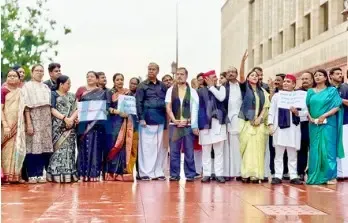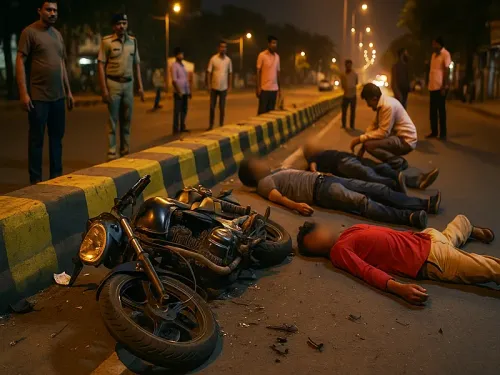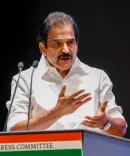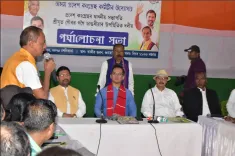Are Political Alliances Really Strange Bedfellows?

Synopsis
Key Takeaways
- Political alliances can transcend ideological differences.
- Shared objectives often unify opposing parties.
- Political landscapes can shift rapidly.
- Historical context shapes current alliances.
- Coalition dynamics are essential for electoral strategies.
New Delhi, Oct 6 (NationPress) “Misery”, penned by the renowned playwright William Shakespeare, “acquaints a man with strange bedfellows.”
This phrase appears in ‘The Tempest’, illustrating Trinculo's dire circumstances, where he must share a cloak with the peculiar and odorous Caliban to weather a storm.
In the realm of politics, the term “strange bedfellows” frequently describes alliances between parties with opposing ideologies that unite to navigate political turmoil or confront a dominant party.
In the late 1980s, the V.P. Singh-led National Front—a coalition of various parties—struck a deal with both the Bharatiya Janata Party (BJP) and the Communist parties to avoid contesting one another in numerous parliamentary seats.
This agreement was not based on shared ideology but rather aimed at preventing the Congress party, from which Singh had previously defected, from maintaining power.
As the century turned, shifting political landscapes led many of these parties to alter their allegiances.
Notably, Lalu Prasad Yadav, the former Chief Minister of Bihar and Rashtriya Janata Dal (RJD) leader, once chaired a steering committee established by Jayaprakash Narayan to orchestrate anti-Emergency protests.
Reflecting on those times, Yadav has often recounted his imprisonment under the stringent Maintenance of Security Act (MISA) for over 15 months.
However, in an article he later co-authored with a journalist, he recounted those memories to criticize BJP leaders who labeled the Emergency's imposition on June 25 as a “black day.”
Ironically, the same party that imprisoned him in the 1970s, and which he later defeated in 1990 to become Bihar's Chief Minister, is now allied with the RJD.
The adversary this time is the same BJP that had previously supported an anti-Congress coalition.
Similarly, the Left Front ascended to power in West Bengal, propelled by a significant anti-Emergency wave in 1977.
Since then, clashes with Congress in the state have resulted in widespread casualties and devastation during the 1980s and 1990s.
Yet, today, the two parties are coalition partners against the ruling Trinamool Congress in West Bengal and the National Democratic Alliance (NDA) in Bihar.
In Kerala, the Communists are at the helm of a coalition government, while the Congress-led Opposition attempts to unseat them.
Moreover, the Left parties previously withdrew support from the Manmohan Singh-led United Progressive Alliance (UPA) government during its second term over a nuclear agreement with the U.S.
In Bihar, another member of the Opposition coalition, Mahagathbandhan, is Pashupati Paras, the president of the Rashtriya Lok Janshakti Party.
He served as the Union Food Processing Industries Minister in the NDA administration from 2021 until his resignation in 2024.
Now, he has joined the Mahagathbandhan alliance to secure seats and support for the upcoming Bihar elections in November.
Despite the inherent contradictions and conflicting political ideologies, the sole unifying factor among these parties is a shared objective to oppose the BJP.
In this ongoing political game of musical chairs, the Telugu Desam Party and Janata Dal-United, aside from a brief interlude, remain among the few parties that consistently oppose Congress.










